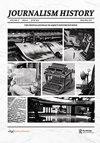“Free Speech Is Sometimes a Dangerous Privilege”: Western Editors’ Support for Press Suppression during the US Civil War
Q4 Social Sciences
引用次数: 0
Abstract
ABSTRACT Little research has been undertaken that examines editors’ views on freedom of the press during wartime. This research explores how and why editors in the far Western states and territories supported, encouraged, and rationalized press suppression during the American Civil War. Despite their distance from the fighting, the majority of the West’s Republican editors believed passionately in the Union cause and pledged their loyalty to the nation. Many members of the Democratic press did, as well. But two-party partisan hostilities motivated editors to encourage press suppression, as did fear of the opposition press’s power. Economic concerns also proved a motivating factor for press suppression in some communities. Western press members often used popular, rather than Constitutional, definitions of treason to support, explain, and encourage suppression of fellow editors whose newspapers appeared disloyal.“言论自由有时是一种危险的特权”:美国内战期间西方编辑对新闻压制的支持
关于战时编辑对新闻自由的看法的研究很少。本研究探讨了在美国内战期间,远在西部各州和地区的编辑是如何以及为什么支持、鼓励和合理化新闻压制的。尽管他们远离战场,但大多数西部的共和党编辑热情地相信联邦的事业,并承诺忠于国家。许多民主党媒体成员也这么做了。但是两党敌对促使编辑们鼓励压制新闻,对反对派新闻力量的恐惧也是如此。经济方面的考虑也被证明是一些社区压制新闻的一个动机因素。西方新闻工作者经常使用流行的,而不是宪法的叛国罪定义来支持、解释和鼓励对那些报纸不忠的编辑同行的镇压。
本文章由计算机程序翻译,如有差异,请以英文原文为准。
求助全文
约1分钟内获得全文
求助全文

 求助内容:
求助内容: 应助结果提醒方式:
应助结果提醒方式:


